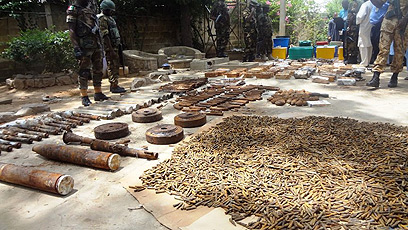
There aren't enough bars jihadis would go to. Nowhere you could go, sit with a drink, and eavesdrop on the messy, convoluted and contradictory mess that is violent jihadism around the world. So instead we have the imaginary Sharaaabtoon, a place where various self-proclaimed mujahadeen will be brought forth to be seen and overheard, just as if they were the clientele of a bar. Remember: no shahada, no service. Twitter: @Sharaabtoon
Thursday, 30 May 2013
Hezbollah Militants arrested in Nigeria (of all places)
Summary: Hezbollah militants have been arrested in Nigeria, home turf of their theological enemy Boko Haram: were they seeking an odd-couple alliance with Boko Haram, trying to get into the African arms dealing market, or just taking advantage of Nigeria's chaos to move weapons and money? Or were they planning an attack on African soil?
Three Lebanese men have been arrested in northern Nigeria, admitting to being members of Hezbollah, and captured along with their stash of heavy weaponry and cash. They were arrested in Kano, the largest city in northern Nigeria, and a hub of activity for the Boko Haram terrorist organisation.
Now, not all jihadis are the same -and Hezbollah and Boko Haram represent very different parts of the jihadi spectrum, which we would expect to make them deadly enemies. Hezbollah is the world's foremost Shia jihadi group, which has recently hardened its sectarian edge with its pro-(Alawite) regime intervention in the Syrian civil war. By contrast, Boko Haram is a Salafi (ultra-conservative Sunni) organisation which has much in common with Hezbollah's al Qaeda-linked enemies in Syria. So what exactly are three members of Hezbollah doing in Boko Haram's back yard?
There seem to be four likely explanations:
Firstly, Hezbollah is seeking links to Muslim Africa's growing violent jihadi groups, regardless of theology. Having burned so many of is bridges in the Sunni world with its support of al-Assad in Syria, Hezbollah is in need of new jihadi friends to share information with and receive sanctuary abroad from, preferably ones who are indifferent to events in Syria. Boko Haram is not directly linked to al Qaeda or any other 'Arab' terrorist groups, and thus has no direct stake or interest in events inthe Middle East. Being fundamentally local in its outlook (desiring the establishment of shariah law in Nigeria), Boko Haram might not have many qualms about forging an alliance with a far-off Shia group, if the main interaction between them were beneficial to Boko Haram.
Secondly, Hezbollah could be selling weapons to African jihadis to raise funds for its war in Syria, or even seeking to buy heavy weaponry 'liberated' from Gaddafi's armouries and since acquired by militants. The men arrested reportedly had eleven 60 mm anti-tank weapons, four anti-tank landmines, two rounds of ammunition for a 122 mm artillery gun, 21 rocket-propelled grenades, seventeen AK-47s with more than 11,000 bullets and some dynamite. This economic endeavour would fall below the level of an operational alliance, and would simply entail Hezbollah and Boko Haram being occasional business partners. Boko Haram could perhaps become the middleman between Hezbollah and the wider network of African jihadis which the former has links to, and which the latter may want to sell to or buy from.
Thirdly, Hezbollah might just be taking advantage of the security crisis in northern Nigeria to smuggle weapons and money under the radar. This would mean no link to Boko Haram, and rather a focus on Nigeria's large and business-savvy Lebanese expatriate community. Hezbollah is believed to have extensive fundraising networks amongst Shia Lebanese groups overseas, and the arrested militants in this case had over $60,000 in cash. Nigeria also has a small indigenous Shia population, the product of conversions by the radical preacher Ibrahim Zakzaky since the 1980's. Zakzaky still leads this community in Nigeria, and calls for an Islamic government enforcing shariah law, albeit campaigning for this in a peaceful manner.
Finally, and possibly consistently with any of the above, Hezbollah could have been amassing these weapons in preparation for a terrorist attack on African soil. Hezbollah has committed terrorist attacks abroad, especially against Israeli targets, as far apart as Buenos Aires (1992) and Bulgaria (2012). Israel has an embassy in Nigeria's capital Abuja, as do the United States and several other Western powers backing Hezbollah's enemies in Syria.
If not bedfellows, it seems jihadism at least makes for strange neighbours.
Labels:
Hezbollah,
Israel,
Lebanon,
Nigeria,
The Sahara/The Sahel
Subscribe to:
Post Comments (Atom)

Update: Kano's military spokesman Captain Ikedichi Iweha has stated that the arms seized from the Hezbollah militants "were targeted at facilities of Israel and Western interest in Nigeria", however he elaborated no further on this.
ReplyDeleteIf so, it appears this was the fourth of Sharaabtoon's explanations -Hezbollah was planning a terrorist attack on African soil, with the Israeli embassy in Abuja a likely target.